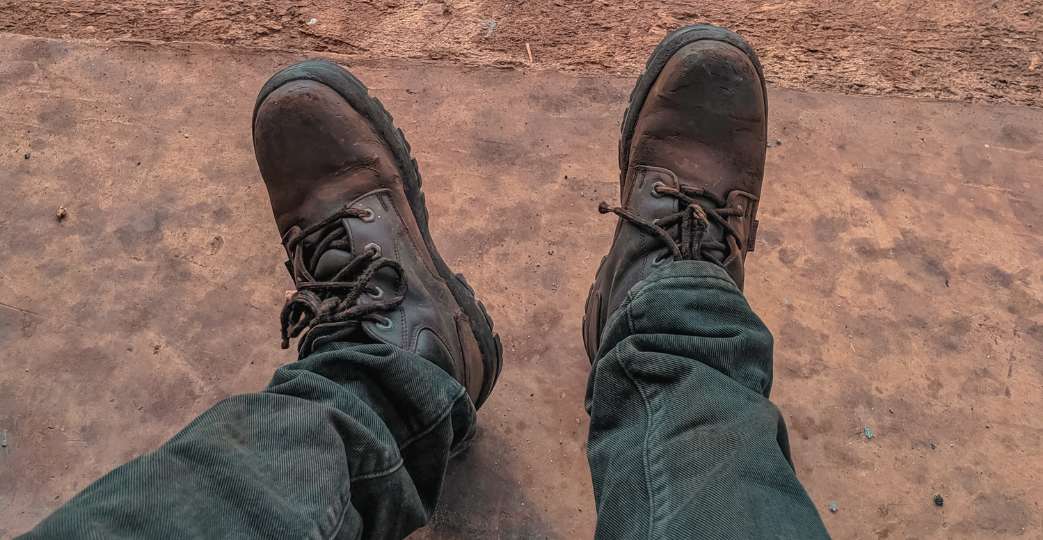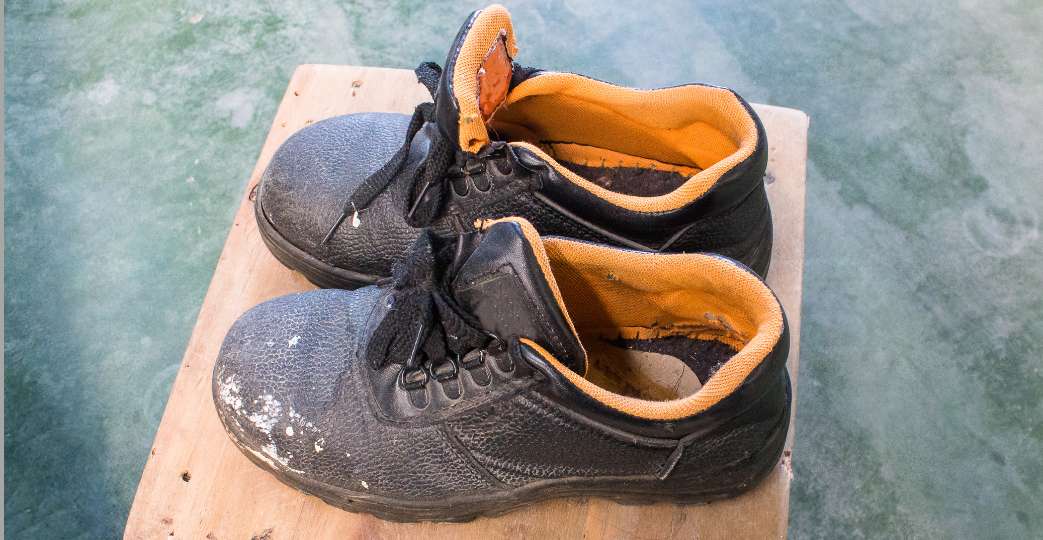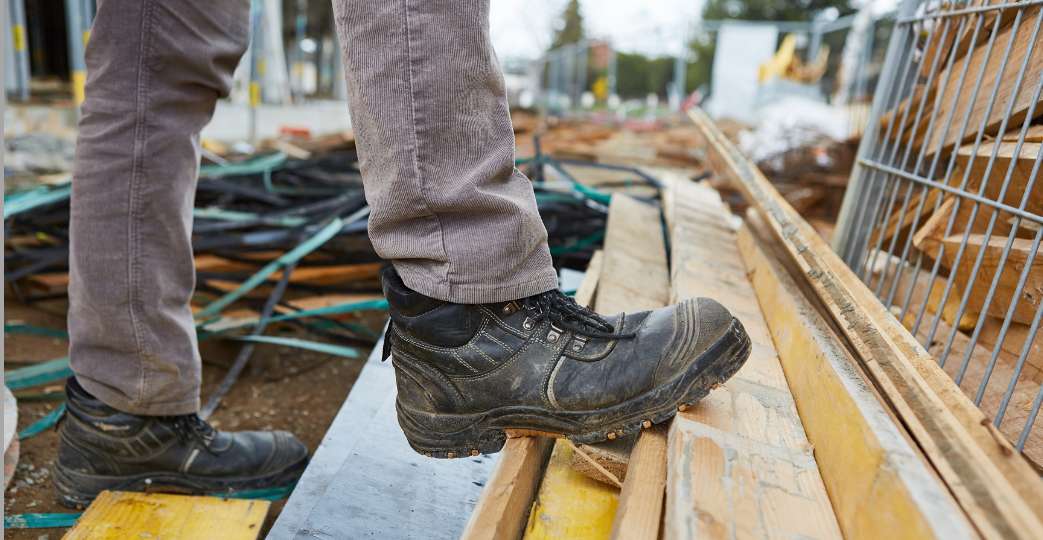How Often Should Safety Shoes Be Replaced for Safety?

February 11th 2025
Daily jobs, especially for hard physical work like construction, need safety shoes. These shoes are our silent protectors. They guard our feet from different hazards.
Even though they are sturdy, safety shoes don't last forever. So, how often should safety shoes be replaced for safety?
In this blog, we'll explore safety shoes features, when to get new ones, how to keep them in good shape, and why this matters so much for your safety and work.
Understanding the Core Function of Safety Shoes
Safety shoes are specially designed to keep your feet safe in all sorts of work situations. Think of them as your personal foot armour. When working on construction sites, warehouses, or factories, your safety shoes become an essential part of your protective gear. Let's break down why they are important:
1. Protection from Heavy Stuff
One of the biggest dangers out there is things falling or rolling onto your feet. Steel-toed boots are your go-to for this. You need these, especially if you are on a construction site. They have strong toe caps that are made from either steel or some composite material, and these caps absorb the impact when something heavy hits your feet.
These caps can handle a lot of force. We ensure our shoes meet the standards for this, so you know they will protect you from falling tools or materials.
It's not just falling stuff that is a problem. Heavy things can roll over your feet. It is a real danger when things are moving around all the time, and safety shoes will protect you.
2. Keeping Your Feet Safe from Sharp Stuff
Your safety shoes also have to protect you from sharp stuff on the ground. Construction sites often have nails, bits of glass, or metal everywhere. Regular shoes won't cut it. That's why safety shoes have strong soles.
These soles are usually made with special materials like Kevlar or steel plates. These act as a shield between your foot and sharp objects.
When you have a lot of debris around, like in construction or manufacturing, these soles are more than just a good idea; you need them for safety.
3. Keeping You on Your Feet
Slips and falls are super common on the job, and they cause a lot of injuries. Safety shoes often have soles that will grip better.
The soles are made from rubber or polyurethane, which will keep you steady on slippery floors. It is crucial if you work around water or in places where floors are wet, like kitchens or industrial sites.
Many safety shoes have high tops to support your ankles. It will stop your ankles from getting injured if you lift heavy things or walk on uneven ground.
4. Protection from Electrical Hazards
If you work with electrical equipment, you need shoes that can protect you from shocks.
Some shoes are built to be resistant to electricity, so they protect you from electrical shocks. Electricians need this kind of protection.
FEPY has an exclusive collection of safety shoes that meet the standards set by organizations like ASTM. It ensures that they keep you safe if you are working around electrical hazards.
Signs That It's Time to Replace Your Safety Shoes

Regarding safety footwear, knowing when to replace your shoes is crucial for maintaining your protection and comfort on the job. Safety shoes safeguard your feet from various hazards, but they can lose effectiveness over time. Here are the key signs that indicate it's time to invest in a new pair of safety shoes. It's in your best interest to replace them if you find these:
1. Visible Wear and Tear
One of the most straightforward indicators that your safety shoes need replacing is visible wear and tear. It includes:
- Worn-out Soles: The soles of your safety shoes are essential for providing traction and stability. If you notice that the tread has worn down significantly or has become smooth, it compromises your grip on surfaces. Just like driving on bald tyres is dangerous, walking in shoes without proper tread can lead to slips and falls.
- Damaged Toe Caps: For steel-toed boots, check for dents or cracks in the toe cap. If you can see any damage or if the steel toe is shining through the material, it's time for a replacement. Composite toe caps can also suffer invisible damage that affects their protective qualities, so if you suspect damage from a heavy object falling on your shoes, it's best to err on the side of caution and replace them.
- Separated Materials: Inspect where different materials meet—if you see a separation between the upper part of the shoe and the sole or if there are any tears in the fabric, these are clear signs that your shoes have reached their limit.
2. Functionality Compromise
Safety footwear must perform its protective function at all times. If you notice any decline in functionality, such as:
- Reduced Protection: If your shoes no longer feel secure or protective—perhaps due to damage or wear—this is a critical sign that they need replacing. Shoes should provide adequate protection against impacts, punctures, and slips; if they fail in these areas, they no longer serve their purpose.
- Loss of Comfort: Comfort is vital when wearing safety shoes for extended periods. Suppose you find that your shoes are causing discomfort or pain. In that case, it may indicate that the cushioning or support has deteriorated. While insoles can sometimes be replaced, if discomfort persists even with new insoles, it's likely time for a new pair.
3. Mileage and Usage Frequency
While there isn't a strict mileage marker for replacing safety footwear, we and many experts suggest monitoring usage closely:
- General Usage Guidelines: On average, safety shoes begin to show signs of wear after approximately 1500 kilometres of use, which translates to about one year of daily wear under typical conditions. If you work in more demanding environments or spend long hours on your feet, this timeframe may shorten significantly.
- Job-Specific Factors: Different jobs impose varying levels of stress on footwear. For instance, those working in construction may need to replace their shoes more frequently than someone in an office setting due to exposure to harsher conditions and increased physical activity.
4. Damage from External Forces
Accidents happen on job sites; therefore, assessing damage from external forces is crucial:
- Impact Damage: If something heavy falls on your safety shoes, inspect them thoroughly afterwards. Steel-toed boots can show visible dents from impacts; however, composite materials may sustain internal damage without any visible signs. It's wise to replace them if they have been subjected to significant effects.
- Punctures and Penetrations: If you experience a puncture or see any holes in your footwear—even if they seem minor—this could compromise their integrity. A punctured shoe can allow sharp objects or liquids to penetrate inside, putting your feet at risk.
5. Age of the Shoes
Even if your safety shoes appear to be in good condition externally, age plays a significant role in their effectiveness:
- Lifespan Considerations: Most safety shoes have a lifespan ranging from six months to two years based on usage intensity and quality. As materials age, they can lose their protective properties even if they look fine on the outside.
- Regular Inspections: It's advisable to conduct regular inspections every six months or so to assess not only visible wear but also hidden deterioration due to age.
Caring for Your Safety Shoes

Caring for your safety shoes not only makes them last longer but also keeps you safe on the job. A well-kept pair of safety shoes lowers your chances of getting hurt and makes your workday more comfortable. Let's go over some proven methods to keep your work shoes in great shape.
1. Clean Your safety shoes Every Day
Clearing off your safety shoes after each shift doesn't have to be a chore. If you spend a few minutes doing it, the payoff is huge. Use a gentle brush or a slightly wet cloth to wipe off any dirt or grime that has gathere¬d during the day.
For Leather Shoes, use a good-quality leather cleaner or mild soap with warm water. Gently scrub every nook and cranny with a soft cloth or sponge. After cleaning, massage a leather conditioner into the material to keep it smooth and crack-free.
For Fabric Shoes, use warm water and a sponge to cleanse the fabric parts. Don't use strong chemicals that can harm the material. Regular cleaning helps the materials last longer by protecting them from dirt and chemicals.
2. Airing out Your safety shoes
Keeping your work shoes ventilated is key to preserving them. Once you've worn them, allow them to air-dry in a cool, dry place to get rid of any dampness which can cause bad smells and bacteria.
If your shoes have re¬movable insoles, let them dry separately. It will lower the risk of fungi or bacteria.
When drying your shoes and insoles, please don't leave them close to heat sources like radiators or heaters since too much heat can distort their shape and ruin the materials.
3. Switch Between Two Pairs of Work Shoes
Purchasing two pairs of safety shoes is a smart move that will pay off. This way, you'll give each pair enough time to dry completely between uses.
Switching prevents the buildup of dampness and makes both pairs last longer. It keeps you comfortable as the materials get back into shape and become flexible again. It will slow down wear and tear on your shoes.
4. Store Them Correctly
Correctly storing your safety shoes has a significant impact on how long they'll last. Keep your shoes in a cool, dry area with good air movement. Stay away from humid places or direct sunlight, which gradually ruins materials.
If you haven't worn your work shoes for a good while, don't forget to check on them. Otherwise, the soles might get ruined because the materials can degrade.
5. Check Them Regularly
Frequently checking your work shoes helps you catch early signs of wear and te¬ar. Look for any loose stitching, worn-down soles, punctures, or any other signals they might not protect you as much anymore. Repairing these issues may prevent them from getting worse.
Consistently check the soles for any trapped small objects that might impact the grip or cause punctures.
6. Let Professionals Clean Them
If Needed Despite our best efforts, safety shoes might need an e¬xpert's touch. If you can't get rid of stubborn stains or smells, take them to a professional shoe cleaner.
Some brands revive your shoes to their original condition and function.
7. Avoid Common Mistakes
Avoid usual mistakes to extend your work shoes' lifespan. Don't Expose Them to Harsh Conditions. Never leave your boots in very hot or very cold conditions or wet places for too long.
Never make changes or fix them yourself without asking advice from professionals or the makers; you could void warranties or ruin safety features.
Always wear good socks made of breathable mate¬rials that take away sweat from your feet. It avoids too much sweating, leading to bad smells and discomfort.
Final Words
Investing in high-quality safety shoes is as crucial as any other protective gear on site. When it's time for an upgrade or replacement, visit our website, where we offer a wide range of construction materials and tools tailored to meet all your needs in the UAE market.
Always turn on the notifications so you don't miss the limited deals we run over time. Also, if you want to buy safety shoes in quantity, we always provide special discounts on bulk orders.
You can become a FEPY PRO member to get additional features like quick delivery, regular discounts, priority support and credit features.